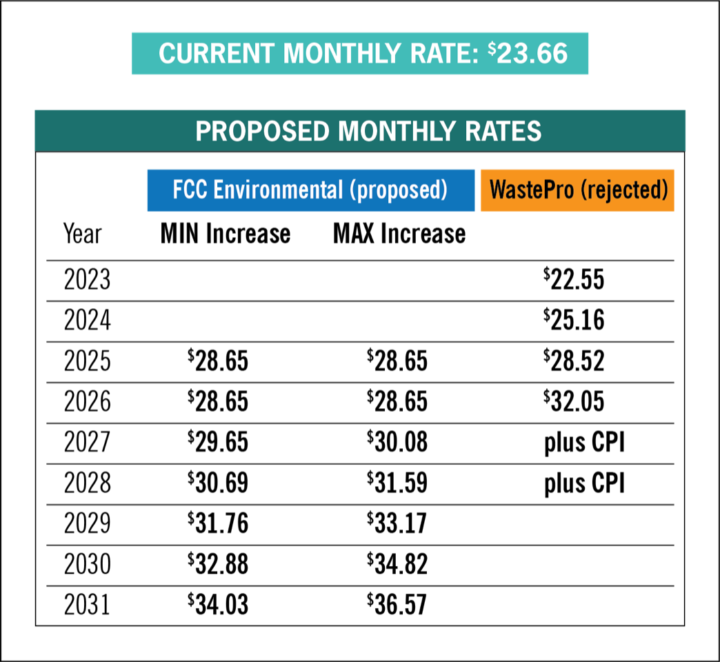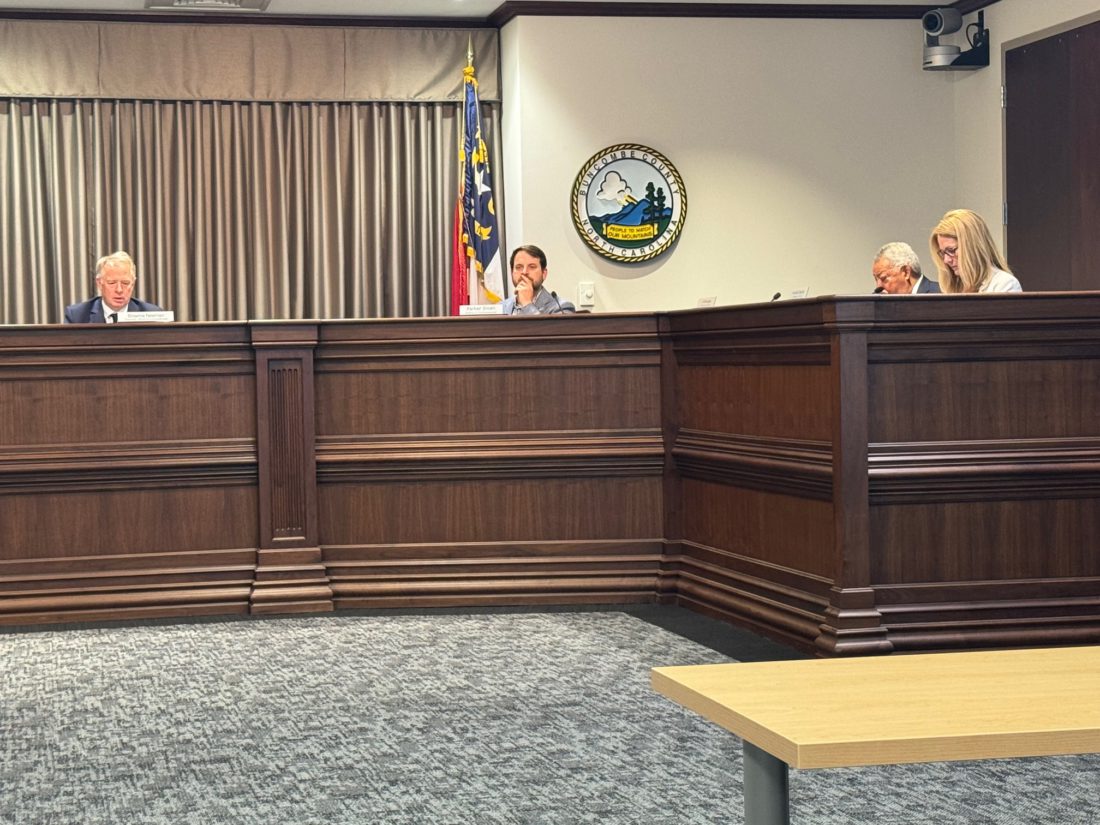Residents of unincorporated Buncombe County appear destined to have a higher bill for trash collection service next year but could save money over the course of the seven-year contract compared with a proposal from current provider WastePro.
If the county Board of Commissioners approves a contract next month with global waste management company FCC Environmental Services, whose U.S. headquarters are in Texas, residents will see an almost $5 a month increase in their trash bills next year.
In November, WastePro proposed a five-year contract extension with the county, which included multiple rate increases, starting with a rate of $25.16 a month in 2024, up from the $22.55 customers paid last year, which prompted commissioners to seek bids from other vendors. WastePro’s contract expires at the end of 2024. After the county rejected WastePro’s November proposal, the firm increased its 2024 rates to $23.66.
FCC Environmental’s 2025 fee would be $28.65 a month starting Jan. 1, if its proposal is accepted. The contract would allow it to boost prices after the first two years if the consumer price index rises.

By 2031, customers could be paying between $34.03 and $36.57, depending on the consumer price index. Other reasons for possible increases would be if the county increases its landfill tipping fees or if federal or state laws require more work than is laid out in the contract.
WastePro’s extension offer included steeper increases as the contract wore on, with prices reaching $32.05 a month in 2026, compared with FCC’s rate of $28.65 that year. In the final two years of the contract as it was proposed, WastePro could include increases consistent with the consumer price index, similar to FCC’s proposal.
While a representative for Republic Services attended the county’s pre-bid meeting, FCC and WastePro were the only two firms that responded to the county’s request for proposals for trash pickup service, said county spokesperson Stacey Wood.
Commissioner Amanda Edwards asked FCC representatives what starting pay for employees would be at the April 16 board meeting.
Charles Merkley, FCC’s director of municipal sales, said starting pay ranges from $26-$32 an hour for drivers, $22-$27 an hour for helpers and $23-$28 hourly for office workers.
“We don’t, in all of our company, skimp on paying our people. They are the front people of our company. Happy people provide happy customers,” Merkley said.
FCC plans to hire 28 people and has a letter of intent already on file to buy property to house its trucks if the contract is approved, he said.
There are a few other differences between FCC’s proposal and WastePro’s expiring contract, said Dane Pedersen, solid waste director for Buncombe County.
If approved, FCC would provide a low-income program with a 15% discount for up to 700 subscribers earning less than 150% of the federal poverty level.
FCC won’t charge customers to replace rollout carts, while WastePro charges a delivery fee. At the end of the contract, the county will own the carts initially supplied by FCC.
The contract also includes provisions in which the county could penalize the contractor, such as not reporting or cleaning up leaks and spills from FCC trucks, not supplying a subscriber with a new cart within seven days, operating unsafe equipment or failure to meet the contract start date of Wednesday, Jan. 1, 2025.
If the contract is approved, a transition plan is due to the county Monday, July 1, a contingency plan Sunday, Sept. 1 and emergency plan Friday, Dec. 6. FCC must have all equipment on-site Saturday, Dec. 20 before service begins Jan. 1, Pedersen said.
FCC is a large company with more than 60,000 employees in more than 30 countries. It earned about $9.8 billion in revenues in 2023, according to its presentation. FCC operates in more than 35 U.S. sites, including Omaha, Neb., and Palm Beach County, Fla.
Chuck Stiles, division director of solid waste and recycling for the International Brotherhood of Teamsters, urged commissioners to avoid a partnership with FCC Environmental because, he said, “They have a horrible record with labor.” Stiles cited several specific examples of FCC’s track record, none of which could be independently corroborated by Xpress.
The contract will be up for first reading Tuesday, May 7 and second reading Tuesday, May 21, when it could attain final approval.
Buncombe’s 911 operators to use machine learning
Calls to one of Buncombe County’s four nonemergency lines will no longer be directly answered by a person, once a new automated answering system is launched.
Instead, callers will interact with Amazon Web Services’ machine learning software, which will direct them to the appropriate human-led department, cutting down on the amount of time operators in the understaffed 911 call center spend on nonemergency calls.
The 911 call center takes 565 emergency calls and 825 nonemergency calls per day, said Lillian Govus, county director of communications and public engagement. Calls to nonemergency lines are for anything from requests for directions to the Blue Ridge Parkway to questions about upcoming fireworks displays and reports of nonthreatening bear activity, Govus said.
“[We’re] trying to figure out a way for our telecommunicators to really focus on the first responder aspect [of the job], especially when the call volume exceeds current staffing capacity,” Govus said.
The new software will alleviate the pressure on the 911 call center, which will continue to field all emergency calls.
In Charleston County, S.C., the system cut call volume by 36% for dispatchers, Govus said.
Starting as soon as Monday, April 22, staff will undergo a 30-day training for the system, whereby first a machine and then a human dispatcher will ask callers the same questions, so the software learns how it should direct callers.
Govus stressed that all information provided on the calls will stay with the county, and Amazon will not have access to anyone’s personal information.
The four lines that will be affected are the nonemergency lines for Asheville Police Department, Buncombe County Sheriff’s Office and Emergency Medical Services and fire line, as well as the Department of Social Services’ after-hours line.




Yep, this seems about the norm for negotiating here. It appeared that much of the discussion prior to this open negotiation was about Wastepro’s unnatural rise in pricing. And now, here we are looking at no tangible difference in pricing, but certainly increases to customers. Time to start wondering aloud who is getting paid here and why the May 7th & 21st meetings will feature a vote to approve a change in vendors that doesn’t seem to bring any economic benefit to the underlying customers. Just new cans and a new company to complain about.